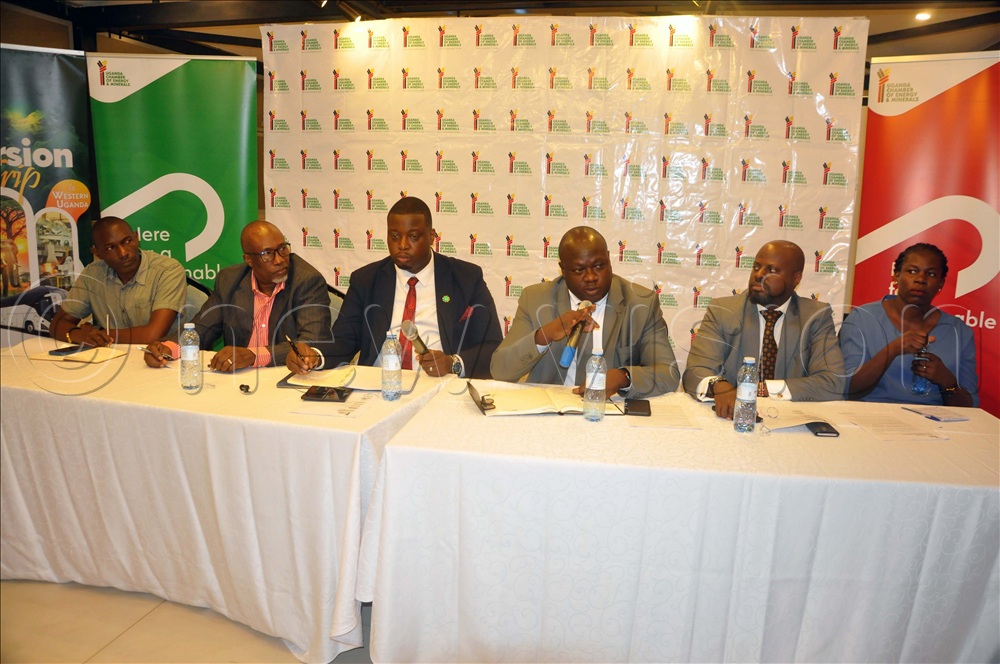Uganda eyes mineral wealth to drive economic transformation
Officials and industry leaders say that with effective management, value addition, and sustainable practices, the mining sector could once again contribute more than 7% to the country’s GDP, reviving levels last seen in the 1950s.
(L-R) Mugyenyi, Kakuuku, Asiimwe, Kiiza, Okurut, Rukare during the launch of a 30-day mining media campaign designed to spotlight the country’s mineral potential and promote sustainable development in the sector at Four Points by Sheraton. (Photos by John Odyek)
________________
Uganda is positioning its vast mineral resources as a cornerstone for economic transformation, job creation, and regional competitiveness.
Officials and industry leaders say that with effective management, value addition, and sustainable practices, the mining sector could once again contribute more than 7% to the country’s GDP, reviving levels last seen in the 1950s.
Felix Okurut, the assistant commissioner for finance and planning in charge of monitoring and evaluation at the Ministry of Energy and Mineral Development, urged stakeholders to collaborate to ensure Uganda’s mineral wealth benefits its citizens.
“Uganda is blessed with abundant resources, including gold, cobalt, copper, iron ore, tin, phosphates, marble, rare earths, gemstones, and salt. With proper management, these resources can catalyse economic transformation, create jobs, and position Uganda as a leading mineral producer in the region,” Okurut said.

(L-R) Kakuuku, Mugyenyi, Asiimwe, Okurut, Rukare, Kiiza during the launch of a 30-day mining media campaign designed to spotlight the country’s mineral potential and promote sustainable development in the sector at Four Points by Sheraton.
He noted that the sector’s contribution to GDP has increased from 0.3% in 2009 to 1.9% in the 2023/24 financial year. With continued investment and policy support, the contribution could surpass 7% of GDP, a level last achieved in the 1950s.
While production volumes have declined in recent years, the value of mineral output has risen, driven by limestone, gold, vermiculite, and iron ore. The sector currently employs about 1.6 million Ugandans, the majority in artisanal and small-scale mining.
He was speaking during the launch of a 30-day mining media campaign designed to spotlight the country’s mineral potential and promote sustainable development in the sector. The campaign is organised by the Uganda Chamber of Energy and Minerals (UCEM), the Ministry of Energy and Mineral Development, and various partners.
The campaign, which runs from August 25 to September 25, 2025, was launched at Four Points by Sheraton on September 5, 2025, under the theme “Sustainable Mineral Development through Collaboration, Innovation and Green Transitions: Unlocking Potential for a Resilient Future.”
The initiative seeks to raise awareness of the mining sector’s contribution to Uganda’s economy, highlight opportunities for investment, and emphasise the importance of innovation and green practices in building a resilient future.
Dixon Mugyenyi, the executive director and chairman of the Minerals African Development Institution (MADI), emphasised the need to amplify the mining sector’s role in national development and promote regional cooperation.
“How do we work as a region to develop minerals, undertake value addition, and turn the region into a processing hub? Minerals know no boundaries. Countries must work together to explore, mine, and add value while reducing conflicts,” Mugyenyi, also a sector council member for mining and mineral processing at UCEM, said.
He added that Uganda must transition from a factor-driven economy reliant on unskilled labour and raw exports to a knowledge- and technology-driven economy. The ban on exporting unprocessed minerals, he noted, is a step towards value addition and job creation.
“To build a knowledge-driven economy requires patents, industrial and science parks, export processing zones, and infrastructure investment. Uganda can become a manufacturing hub by investing in skills and processing zones. Working with institutions like the Uganda Revenue Authority, we can shift focus from revenue maximisation to value optimisation,” Mugyenyi explained.
Derrick Rukare, company secretary at Wagagai Mining Uganda Ltd, stressed the importance of showcasing Uganda’s mineral potential to attract investment.
“After quantifying mineral deposits, we need to attract investors and technology while ensuring Uganda retains a controlling interest of at least 85%. This will accelerate structured mineral development,” Rukare, also a sector council member for mining and mineral processing at UCEM, said.
On the governance side, Moreen Kiiza, a business and human rights expert with Enabel Uganda, highlighted the need for respect of human rights in the sector.
“Both the state and businesses have a duty to respect human rights. When violations occur, there should be remedies. A human rights-based approach balances profits with social responsibility and enhances the social licence of mining companies,” Kiiza said.
Concerns about regulations were raised by Humphrey Asiimwe, executive director of UCEM, who noted that some entities hold redundant exploration licences for long periods, blocking other investors from making use of them.
Environmental considerations also featured prominently. Alex Kakuuku, sector council member for sustainability at UCEM and technical director at Geotropic Consults Ltd, stressed that environmental impact assessments (EIAs) are now a key requirement for mining licences.
“EIAs include area-specific baseline surveys to determine environmental conditions. After developments, audits are conducted to compare with the baseline, assess compliance, and identify mitigation measures,” Kakuuku explained.
The campaign is expected to foster dialogue on policy, investment, and sustainable practices while positioning Uganda as a competitive player in the regional and global mining industry.